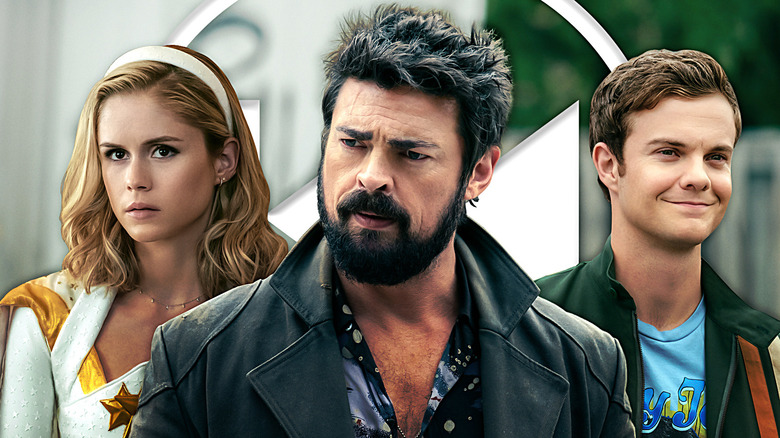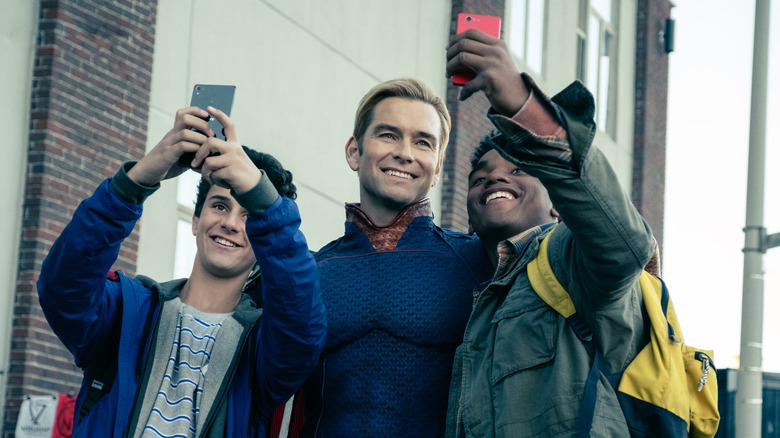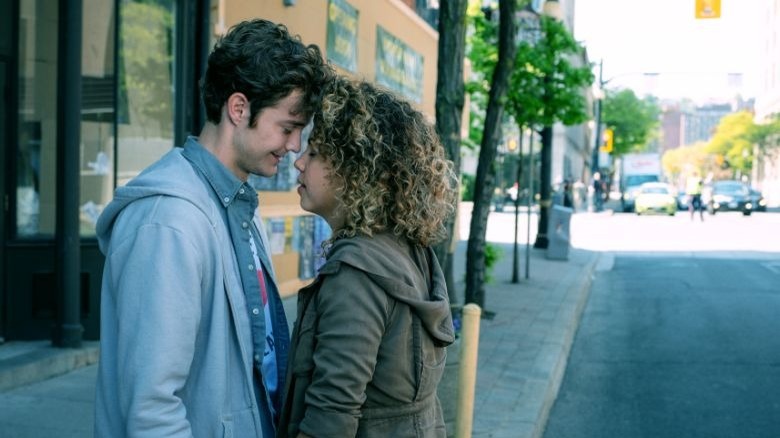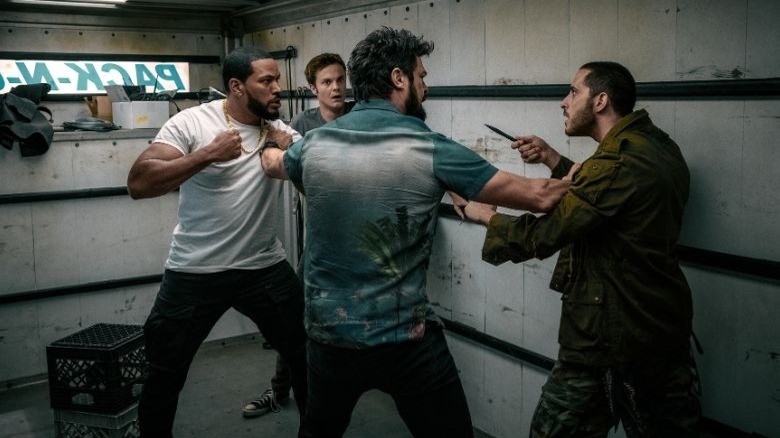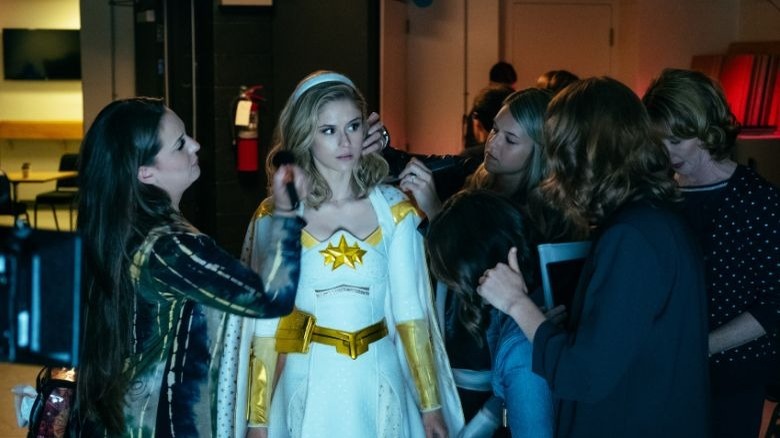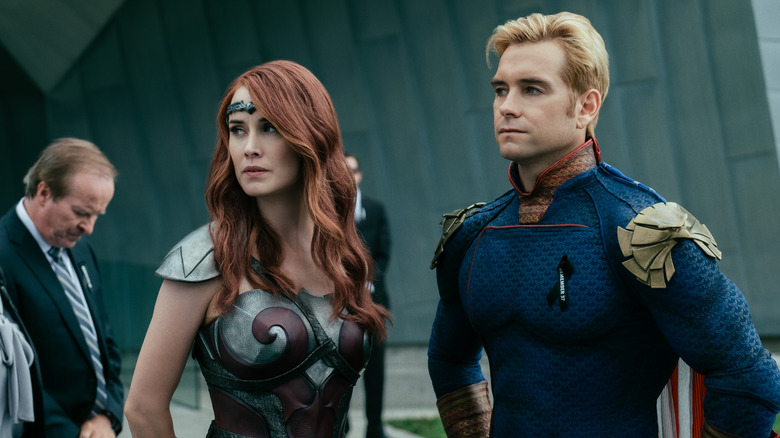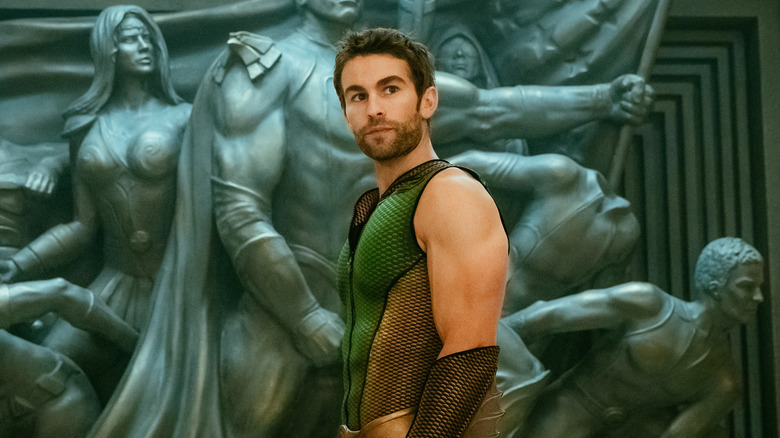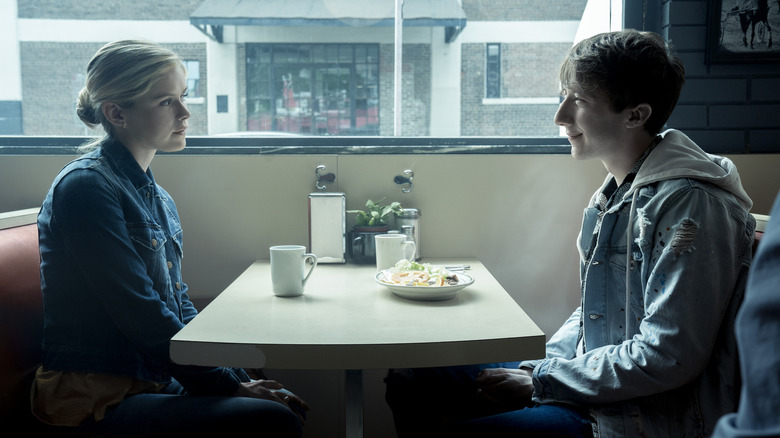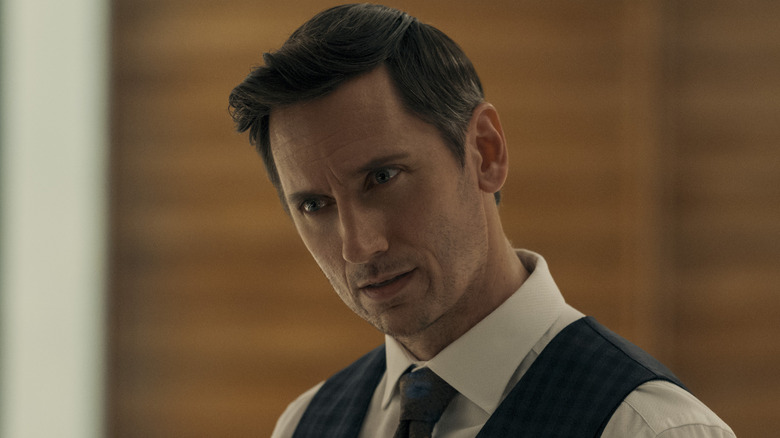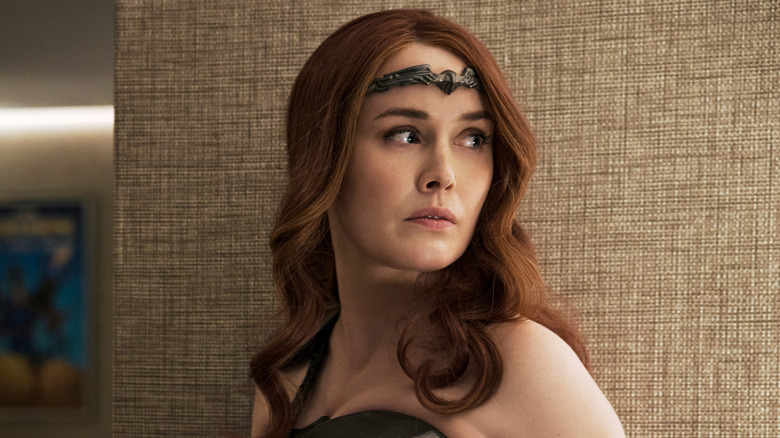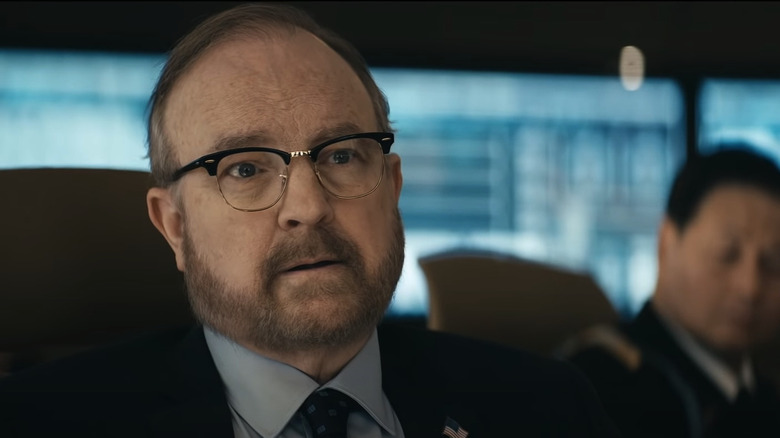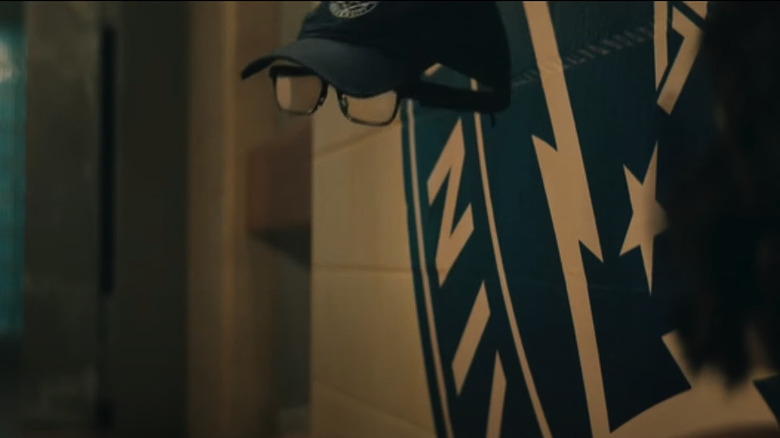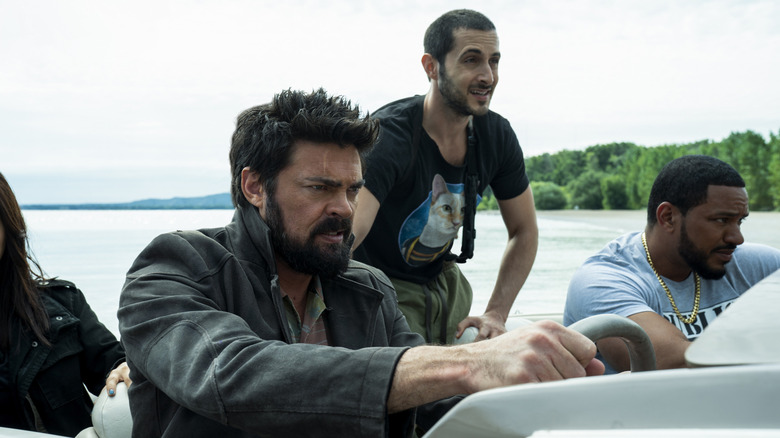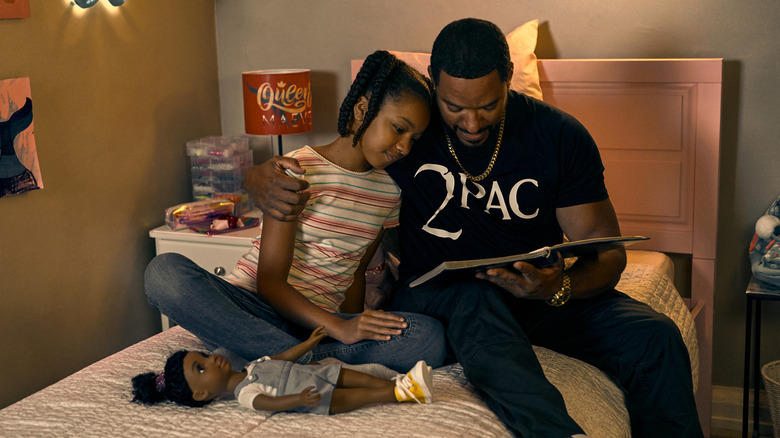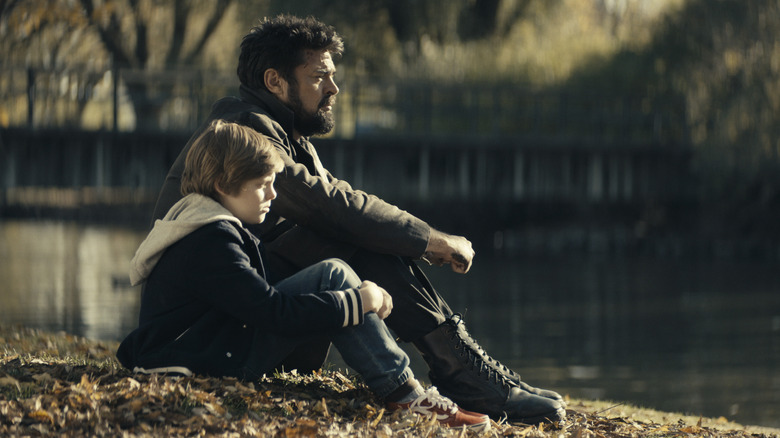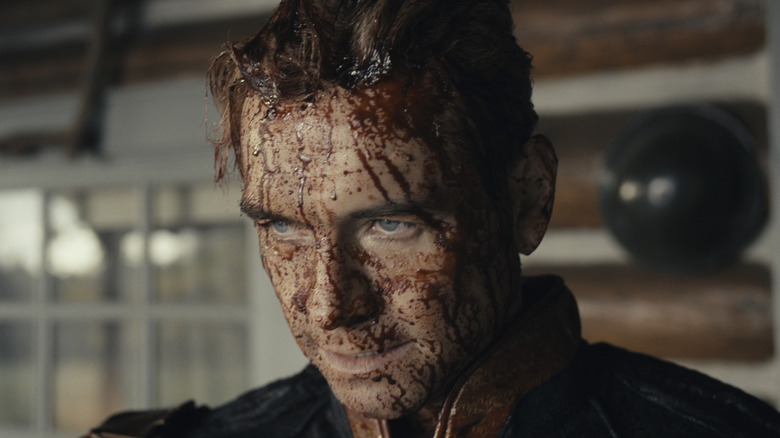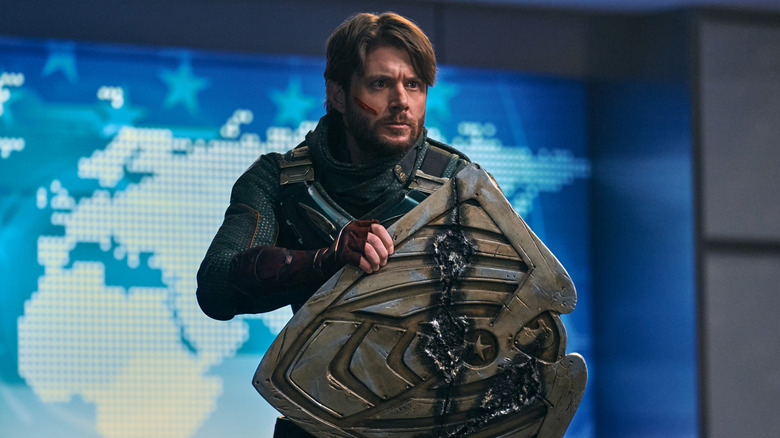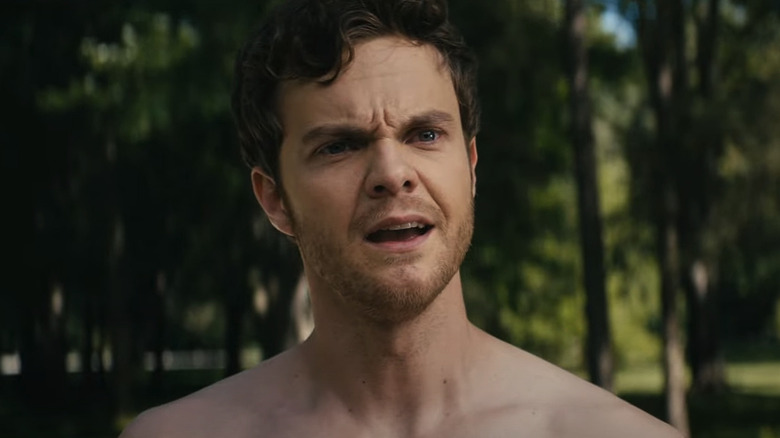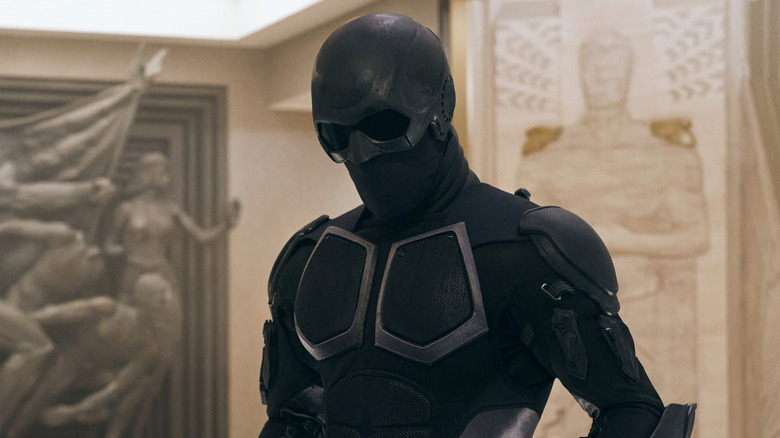We Rewatched The Boys And Here's What We Noticed
As yet another season of "The Boys" looms ahead, we here at Looper cannot wait to dive back into the gruesome world of Prime Video's genre-defying superhero dramedy series. Even if the spin-off series "Gen V" provided a much needed appetizer late last year, the fact that the main course is just around the corner has us hungrier than ever.
Like many of you, our excitement eventually led us to binge all three seasons of the show once more, reliving each diabolical explosion, mutilation, and decapitation just so that we could see how much this story has evolved since it premiered in 2019. Through this rewatch, we learned way more than we expected to about Butcher and his gang, with some revelations potentially leading directly into "The Boys" Season 4. So before we all witness what could well be Butcher's last showdown with Homelander, let's take a look back at all the moments that brought us here.
Homelander's mistake should have blown up in his face
After rewatching all three seasons, we're fairly confident in writing that there's maybe only a handful of scenes in "The Boys" in which the so-called "heroes" actually do anything heroic — and there's even less in which they actually look heroic. One of these rare moments opens up the entire series in Season 1, Episode 1, "The Name of the Game."
While walking down a city street, two young boys witness Homelander (Antony Starr) and Queen Maeve (Dominique McElligott) putting a decisive stop to the robbery of an armored car. Nearly defeated, one of the desperate robbers takes one of the boys hostage, putting him in a loose chokehold and pointing a gun at his head. Homelander neutralizes the situation by melting the weapon with his heat vision. It's as great of an opening scene now as it was in the summer of 2019, perfectly communicating how these heroes are viewed by the world of "The Boys" — even if it's been potentially undermined since.
In a canon episode of the animated anthology series "The Boys Presents: 'Diabolical'" (Season 1, Episode 8, "One Plus One Equals Two"), Homelander is presented with an identical problem and deals with it in the same way. This time, however, the heat causes the gun to combust, killing the hostage and mutilating the villain in a small but vicious explosion.
Hughie's Billy Joel obsession makes a lot more sense
Another nearly-perfect character introduction from the series premiere is given to Hughie Campbell, the soft-spoken super-nerd that transformed Jack Quaid from a "Hunger Games" casualty into a legit star. Right away, his first two scenes reveal the three character traits that will shape him for the rest of the series — that he allows his intelligence to be overridden by his polite and differential nature, that he's head-over-heels in-love with his girlfriend Robin (Jess Salgueiro), and that he's a die-hard fan of legendary musician Billy Joel.
For the entirety of Season 1 and most of Season 2, Hughie's love for the Piano Man is essentially a running gag about his unabashed nerdiness. In this first scene in particular, Robin is playfully teasing him about a poster of Joel on Hughie's wall. Hughie's cheeky response — "Don't ever besmirch Billy Joel" — is the last thing Robin hears before she's killed by A-Train (Jessie T. Usher).
The fact that Joel is tied to what is arguably the defining tragedy in Hughie's life is even more gut-wrenching when we later learn that the artist is connected to Hughie's estranged mother, who suddenly abandoned him and his father (Simon Pegg) when "Wee Hughie" was just six years old. We'll likely hear even more about both her and her own love for Joel when she makes her first appearance in Season 4, played by Rosemarie DeWitt.
The feud between Mother's Milk and Frenchie runs even deeper
That Hughie's life is defined by tragedy is ultimately what helps him connect with his new found-family, the titular "Boys." At the same time, a similarly horrific, life-changing encounter with a Supe is also what alienates weapons expert Frenchie (Tomer Capone) from his former friends, with a once-unaddressed past sin causing Mother's Milk (Laz Alonso) to violently rebuke him as early as Season 1, Episode 3, "Get Some."
Through the vague, barely-challenged accusations of the otherwise pacifistic patriarch, it initially sounds as though the Frenchman's carelessness had cost the lives of Grace Mallory's (Laila Robins) three grandchildren. It isn't until almost the latter half of Season 2 that we learn this story is far more complicated and horrific.
In Season 2, Episode 6, "The Bloody Doors Off," viewers get to see the night in question first-hand. Frenchie — who is revealed to have been coerced into joining Mallory's team after she threatened his own found-family — abandons his duties to save the life of his friend Jay, who is suffering from a life-threatening overdose. Said duties are to keep constant watch over The Seven's Lamplighter (Shawn Ashmore), who then takes advantage of Frenchie's absence to make an attempt on Mallory's life. By the time Lamplighter realizes he chose the wrong bed, it's too late. With all this in mind, it's hard not to feel instant sympathy for Frenchie in Season 1, even as MM is laying into him.
Annie's costume became a huge symbol
As fun as it is to revisit the first season of "The Boys," a lot of it is incredibly difficult to sit through. The treatment of Annie January (Erin Moriarty) — aka Starlight, the then-new recruit to The Seven — by Vought is especially hard to stomach, with her character forced to confront a truly nightmarish and traumatic work environment with essentially zero support.
A smaller but no less humiliating indignity Annie is forced to suffer is the replacement of her modest, teen-friendly costume with a low-cut unitard. Though there's nothing necessarily wrong with the outfit itself, the fact that she is forced to wear it against her will gives every scene in which it appears a sense of palpable discomfort. That discomfort has been imbued with slivers of hope in subsequent seasons, as that costume has become a very effective symbol for the change Annie needs to undergo.
In addition to turning her into a product, the costume makes it impossible for her to go against her evil bosses unnoticed. It even practically inhibits her assistance to the Boys in Season 2, Episode 2, "Proper Preparation and Planning," when she needs to hide a sample of Compound V. It's fitting, then, that her liberation from Vought at the end of Season 3 is punctuated by her ditching the costume down a trash chute. Even if her Season 1 journey is almost unwatchable, at least we now know exactly how she'll fight her way through.
The Flight 37 crash is Season 1's most important moment
A lot of crazy stuff goes down in "The Boys" Season 1. From Robin's death to the demise of a landlord during a terrifying "intimate moment" with Popclaw (Brittany Allen), there's plenty that should haunt viewers to this day. On the other hand, no act has been as consistently and directly impactful on the entire series as the crash of Flight 37.
In Season 1, Episode 4, "The Female of the Species," Homelander and Maeve board a plane mid-flight to stop a terrorist hijacking. Though he kills the antagonists with ease, Homelander's complacent carelessness causes him to accidentally fry the plane's flight controls with his laser vision. Knowing he has no method of reliably saving the plane or sparing anyone on-board to make up for this mistake, Homelander convinces Maeve to let the passengers (read: witnesses) die to cover it up instead.
In the immediate aftermath of the crash, Homelander successfully uses the tragedy to manufacture public approval for the integration of Supes into the military. In following seasons, however, footage of the flight becomes even more important as a tool for (temporarily, at least) blackmailing Homelander into an uneasy peace with the Boys, Starlight, and Maeve. The spin-off series "Gen V" also reveals that two of the victims were related to Godolkin University Dean Indira Shetty, who thereafter embarks on a mission to kill all Supes with a plot that could end "The Boys" as we know it.
We now know why A-Train's prank really rattled The Deep
From the jump, it's clear that Chace Crawford's deeply damaged Aquaman spoof The Deep is one of the show's most messed-up characters. If anyone needs a skilled therapist it's him. But while we do get one surprising scene of The Deep in therapy in the series' fourth episode, his personal revelations are a bit hard to decipher — that is, until we learn more about his sexuality in Season 3.
In Season 3, Episode 6, "Herogasm," Annie catches her former assailant having an "intimate moment" with an octopus. Both the writing and Crawford's exceptional performance lead viewers to believe that he genuinely feels a deep, romantic bond with his present mate. This moment totally recontextualizes a story he shares with his therapist, in which he claims A-Train pranked him by putting a blow-up dolphin in his bed with lipstick around the blowhole.
On first watch, the scene reads as The Deep being deeply troubled by his teammates' constant mocking of his powers, as though this perceived undermining of his importance to the team is a major factor in his fractured psyche. While this may still be the case, it's also undeniable (and supported by his relationship with his gills explored in Season 2) that there's a thick layer of sexual shame at play here as well. It may even be that A-Train has somehow discovered The Deep's fish-loving feelings (perhaps through noted peeping-Tom Translucent) and wants to humiliate him because of it.
Annie's Capes for Christ days come back to haunt her
The preeminent guardian of Des Moines, Iowa, Annie January is born and raised in a more traditional, socially conservative environment — the kind less interested in Supes acting as TV stars or musicians like Tek Knight or A-Train, and more interested in Supes being religious figures. This can be subjective, as in the case of the "godly" Homelander, or literal, as in the case of Ezekiel, Shaun Benson's closeted Reverend Fantastic who guest-stars in several episodes of Season 1.
Both Annie and Ezekiel are prominent figures in a Supe organization called "Capes for Christ." They primarily seem to be involved in youth outreach, spreading Christian Fundamentalism as well as their own gospel, which claims Vought's heroes were chosen via heavenly mandate. When Annie first name-checks the org in Season 1, it sounds as though it will be at most a cringey part of her past she's hoping to bury underneath her high-profile work with the Seven. However, as her standing and faith in the Seven begin to crumble simultaneously in Season 2, she's forced to return to her past.
In doing so, she discovers what became of Gecko (David W. Thompson), a former Capes for Christ member. Gecko's firm rejection of Annie upon their reunion is discomforting, hinting that her path away from the shadow of Vought might force her further into the dark rather than deliver her back to her life of simple heroism in Des Moines.
Tek Knight has always been violently reckless
Whether because he's Garth Ennis' take on the Marvel Comics character Iron Man or because he happens to have one of the most disgusting character arcs in a series full of them, fans of the comics were eager for Tek Knight to appear on screen almost since day one. This is probably why, whenever "The Boys" had an opportunity to name-drop a yet-unseen Supe from the source material, they commonly went with Tek Knight.
But all this name-dropping turned out to be more than fan service. In Season 1, Episode 6, "The Innocents," a young woman shares during a meeting of the Association of Collateral Damage Survivors support group that Tek Knight left her permanently injured after saving her from danger; in Season 3, Episode 3, "Payback," this same story is referenced via a newspaper article posted in MM's closet. While the comics' Tek Knight is defined by his unusual heroism and his predilection for finding the hole truth, his Prime Video counterpart is known solely for causing collateral damage.
When Tek Knight does finally appear in "Gen V" (Derek Wilson), it's made clear why this is. In addition to bearing the shame of his peculiar fetish, his storied recklessness is revealed to have claimed the life of another Supe called Ironcast. When we hear about his incident with the young woman in Season 1, it's now clear that this was the start of the character's reinvention from the comics into someone more reprehensible.
Queen Maeve's protection of Starlight lasts till the end
In Season 1, Episode 8, "You Found Me," we see the first major spike in the trajectory of Annie's relationship with Maeve, when the latter puts herself between Annie and Homelander. As the latter himself says, that moment officially makes Annie Maeve's responsibility — any further transgression on her part will thus jeopardize both of their lives.
It's a powerful scene made all the more so in the aftermath of the Season 3 finale, in which we see how this relationship grows. During the climactic showdown between The Boys, Soldier Boy, Homelander, and Maeve at Vought Tower, Maeve briefly finds herself in a position to exact revenge on Homelander, the man that has caused her nothing but pain for several years. But in this moment of near triumph, she makes an unexpected choice that's totally earned narratively, thanks to seeds planted years earlier.
As showrunner Eric Kripke has explained in interviews after the fact, Maeve probably would have killed Homelander had she not chosen to instead save Annie. For the writers, this was the most logical and satisfying way to end Maeve's arc on the show, with her proving through her relationship with Annie that she is indeed a hero deep down. She then chooses to step out of this protector role with Annie to live a normal life with her partner — thus giving Annie her own chance to prove herself as a true hero in the future.
Robert Singer's presidential bid was subtly teased in Season 2
A major shift that takes place in "The Boys" universe as Season 1 leads into Season 2 is Vought's successful infiltration of the government. Having effectively built up the manufactured threat of Supe-terrorists through some careful propagandizing, CEO Stan Edgar (Giancarlo Esposito) is able to kick off the series' second outing by negotiating a lucrative military deal with none other than the U.S. Secretary of Defense, Robert Singer (Jim Beaver).
Throughout his tenure on the show, Singer has positioned himself as a potential opponent to Vought — someone who desires to break up their corporate hold over America through regulation. This can clearly be seen in his first scene with Edgar in Season 2, Episode 1, "The Big Ride," where he tries to check Edgar's attempt to secure a high-level security clearance for Vought's project. Singer informs him that he'd need to fight the president himself for such a request, but Edgar's insistence and lack of deference in response becomes one of many warning signs that the balance of power is shifting.
Now, heading into Season 4, he has a chance to grab that power back. Singer is currently running for president alongside secret Sup Victoria Neuman, confirming the pair as a loose adaptation of President Robert "Dakota Bob" Schaeffer and Victor "Vic the Veep" Neuman from the comics. Though Edgar himself may no longer be with Vought, the company's treatment of Singer may come back to haunt them when he (likely) takes office.
A Gen V character cameos in the Season 2 premiere
Though he's killed by Hughie (in a method that's equal parts horrific and unmentionable) in Season 1, Episode 2, "Cherry," the Seven's resident creep Translucent isn't given a proper funeral until the first episode of Season 2. In fact, throughout Season 1, Vought lets on that he's merely on a top-secret mission somewhere remote (meanwhile, Alex Hassell appears as the character numerous times after his death via flashback, making the whole timeline a bit confusing).
After so much waiting, it's only fitting that Translucent eventually gets the Vought-approved funeral he truly deserves, complete with an empty coffin, a forced and grating musical number from an obviously uncomfortable Starlight, and some thinly-veiled propaganda from Homelander. During the latter's venomous speech, he graciously shouts out Translucent's family, including his son Maverick (Charles Altow in his television debut). Though nobody knew it at the time, this was the first appearance of a future Godolkin University student in "The Boys'" universe.
As we see (or, more accurately, don't see) in Season 1 of "Gen V," Maverick eventually attends God U, where he hones his own powers of invisibility (creating somewhat of a plot hole for "The Boys"), as well as his powers of conflict resolution and guideline enforcement, given that he's one of the school's few Resident Assistants. In the several episodes in which he appears, Maverick is entirely invisible, and is voiced by "It" cast member Nicholas Hamilton.
That iconic speedboat scene was a nightmare for its star
There's something uniquely enduring about one scene in particular from Season 2, Episode 3, "Over the Hill with the Swords of a Thousand Men." Leading into one of the season's tensest moments between Butcher, Hughie, and Starlight in an underground system of tunnels, "The Boys" precedes it with one of the season's most ridiculous — a scene in which Butcher drives a boat at full speed through a live whale.
The moment is every bit as gnarly as you remember, which makes it not the least bit surprising that it wound up deeply upsetting at least one of the scene's participants — and, surprisingly, we're not talking about Chace Crawford. When asked by Collider to provide his opinion of the series' most outrageous moment, Karl Urban said, "For me, personally, I love the ocean and I love sea life, so to be part of a sequence that drives a speedboat through a whale was pretty surreal."
Urban added that it was even more surreal to see the sequence become so recognizable for the series that it was used as their sample clip at that year's Emmy Awards. "They were calling out the nominations, with all of these prestigious shows, like 'The Crown,' with Prince Charles delivering some great dialogue, and then you cut to 'The Boys' and there's a speedboat ramming into a whale," he said. "It was great. I was happy for everybody involved, to get that little nod."
The death of MM's father hung over the series in an unexpected way
Though viewers see the death of Hughie's girlfriend firsthand and learn about the tragedies which define Butcher, Frenchie, and even Kimiko, aka "The Female" (Karen Fukuhara), throughout the show's first season, it takes much longer for "The Boys" to bring us under the hood of Mother's Milk. In fact, it isn't until Season 3 that we learn why exactly he's so personally invested in taking down Vought's Supes — but it's hinted at as early as Season 2, Episode 4, "Nothing Like It in the World."
While taking a trip down south to Raleigh, North Carolina to investigate the mysterious Vought hero Liberty (later revealed to by Aya Cash's Stormfront), MM shares with Annie that he essentially inherited his crusade against Vought from his father. In so many words, he explains that this fight took a direct toll on his dad's physical health, and the sheer stress of it all eventually sent him to an early grave. The fact that MM chooses to open up about this to Annie is made all the more impactful when we learn that his story is somehow even more tragic than he let on.
It's eventually revealed that Soldier Boy (Jensen Ackles) killed MM's mom while trying to stop a group of thieves. His dad then was not just trying to fight against Vought, but bring his wife's murderer to justice. This not only led to his death, but his wholesale neglect of MM throughout his childhood.
The death of Ryan's mother leads to his downfall
Though "The Boys" gets a lot of credit for subverting audience expectations for comedic effect, it arguably doesn't get enough praise for how well it does so for its overarching narrative beats. A shining example of this is how the series handles the death of Becca Butcher (Shantel VanSenten).
She's a disruptive force right from her re-introduction at the end of Season 1, as the story reveals a serious diversion from the comics — Billy Butcher's lost love is not only still alive, but raising the son of his worst enemy. Throughout the following season, she basically serves as the only force preventing Ryan Butcher (Cameron Corvetti) from becoming anything like Homelander.
When she is shockingly killed in Season 2, Episode 8, "What I Know," it seems as though "The Boys" is setting up a major growth arc for Billy Butcher. It makes perfect sense that Becca's death would force him to step in as a loving paternal figure for Ryan, all the while reevaluating his blanket hatred for Supes and antisocial coping mechanisms. However, "The Boys" twists this relatively common narrative beat into something unexpected by giving Becca's death the complete opposite effect. Though Butcher could honor Becca's memory by taking care of Ryan, he ultimately and characteristically chooses vengeance. This leads Butcher to neglect Ryan and unwittingly send him into the open arms of Homelander.
Season 2's disgusting final scene was meant for a very different moment
Part of the reason why the Season 2 finale of "The Boys" sticks so well with fans is because of its gross-out final moment — a shot of Homelander masturbating on top of New York's Chrysler Building. In its current placement, it effectively symbolizes the ironic impotence Homelander is experiencing after being blackmailed into submission by Maeve.
But as it turns out, that scene was filmed years earlier for the end of Season 1, Episode 2. When Eric Kripke showed it to Amazon, they told him it needed to be cut. It wasn't until they had finished shooting Season 2 that the scene came back into discussion, coincidentally as a consequence of another studio note from Amazon. As Kripke has explained, they wanted something stronger than the original Season 2 ending (which had Homelander simply floating menacingly above Earth), and agreed with Kripke that the context completely changed the meaning of the once-controversial scene for the better.
Jensen Ackles wasn't originally supposed to play Soldier Boy
Don't get us wrong — Jensen Ackles as Soldier Boy is probably the greatest aspect of "The Boys" Season 3 and possibly one of the best things about the series, period. That said, fans would be forgiven if something about casting a youthful 2010s heartthrob as a grizzled World War II veteran felt a bit off to them.
According to Ackles himself, this might be because Soldier Boy was written for an entirely different type of actor. Ackles told Men's Health, "There was a short list of names. And when [Eric Kripke] read off a few of those names to me, I was like, 'Oh, well, there's no way. I don't have a shot at this. Those are movie stars.'" It was suggested that the show's producers were looking for an older, perhaps more grizzled performer. Nevertheless, Ackles lobbied hard for the role and eventually landed it (though it definitely helped that he and Kripke worked together for several years on "Supernatural").
Season 3 turned Jack Quaid into his favorite X-Man
With the introduction of short-term superpower serum Temp V in Season 3 of "The Boys," Hughie gets to indulge in a long-awaited power fantasy. No longer is he the "weak" man that needs to be saved by Starlight, but finally the hero of his own story.
It's a dark turn for the character and an undeniable challenge for Quaid, who basically oozes wholesome charm every time he opens his mouth. Fortunately, he got a bit of extra help pulling these moments of indulgence off, as they were somewhat of a power fantasy for him personally as well. In an interview with Discussing Film, the actor explained, "I loved that the reason why he's being tempted into this dark side is all because of Temp V, and I loved being able to actually play with a superpower. Granted, I had to get naked for a lot of it, but it's a solid trade-off because Nightcrawler is one of my favorite X-Men and I got naked for Nightcrawler powers!"
The showrunners didn't realize Black Noir would have to die
As jarring as Black Noir can often be, perhaps it makes perfect sense that his death was just as shocking. On the other hand, some may have found his demise to come a bit out of left field when they first saw it in Season 3, Episode 8, "The Instant White-Hot Wild." Apparently it may feel this way to some audience members in part because that was exactly how it came up in the writers room.
"I don't think we walked into the finale knowing we were gonna [kill off the character]," Eric Kripke admitted to Business Insider. "It was just as we were tracking Homelander and watching him unravel, I couldn't understand a version where he wasn't gonna have some sort of huge reaction to Noir, who's been lying to him his entire life about the thing Homelander needed most in the world."
Though unexpected, Noir's death — even though Season 4 seemingly resurrects him — was one of the most impactful twists in a finale that left us craving more. Fortunately, we don't have much longer to wait, as Season 4 of "The Boys" premieres on June 13, 2024.
